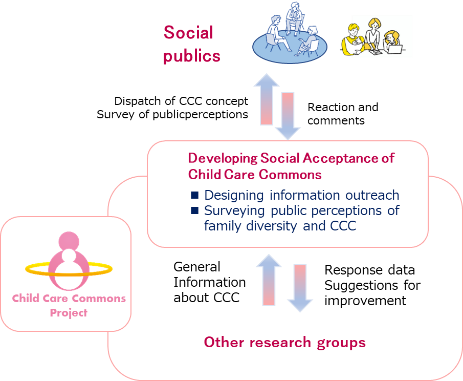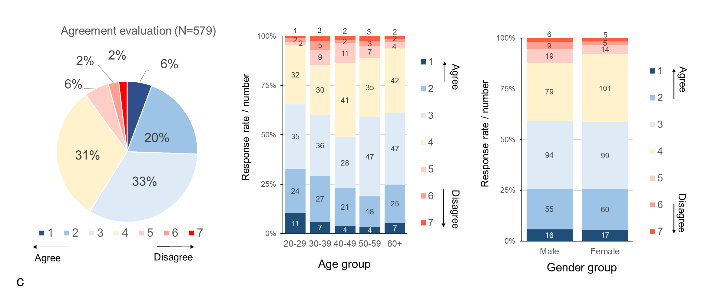Progress Report
Child Care Commons:Building the System Requirements of Alternative Relatives for Our Parenting[3] Fostering Social Acceptance of Child Care Commons
Progress until FY2024
1. Outline of the project
In this research project, we investigate various potential criticisms and opinions from the general public about the possibilities of various child-rearing environments. Furthermore, based on the survey results, we will propose modifications to the system and build requirements for CCC to be accepted by society in general, ultimately aiming to gain a broad understanding of the benefits of CCC and to create an atmosphere of acceptance for voluntary choice of various forms of child-rearing.

2. Outcome so far
Task 5:
- Survey on general impressions of CCC
- We created leaflets, work sheets, and a website (https://childcarecommons.org/) explaining the concepts of CCC. Based on these materials, we conducted multiple surveys to assess the level of understanding and acceptance of CCC. The results showed that approximately 10% of respondents clearly opposed the CCC concept, while 80-90% of respondents agreed with the explanations provided about CCC (see Figure below). From these findings, although there is room for improvement in the details, we were avle to create materials that function effectively as explanatory resources to a certain extent.

- Extraction of requirements for social acceptance of CCC
- In collaboration with Task 1, 2, and 3, we conducted a large-scale survey and found that approximately 25% of respondents expressed an interest in participating in childcare as a third party.
We also asked about their expectations for participating in CCC and potential barriers to participation. Among the expectations, “growing together with children” (39.2%), and “gaining various perspectives through interacting with children” (36.4%) were highlighted, indicating that participants expected personal growth and learning. On the other hand, concerns such as “mental burden” (36.5%), “responsibility arising from involvement” (29.0%), and “financial burden” (27.7%) were identified as barriers to participation.
Additionally, in this survey, when asked about preferred communication media for interactions, about 70% indicated they would like to use social media platforms such as LINE, Instagram, and Facebook appropriately. However, about 30% stated they prefer to communicate only in person, highlighting the need to consider those who do not wish to use social media.
3. Future plans
We found that one in four people are interested in getting involved in childcare as a third party, which was higher than our expectation. However, we also revealed that there are concerns about various burdens and that preferences for communication tools vary from person to person.
In the future, in order to propose a system that will encourage more people to participate, it will be necessary to consider how to support those who feel the burden described above.
Additionally, there is still unanalyzed data, such as data related to personality traits, so it is important to conduct further detailed analyses and report these findings in academic conferences and specialized journals.